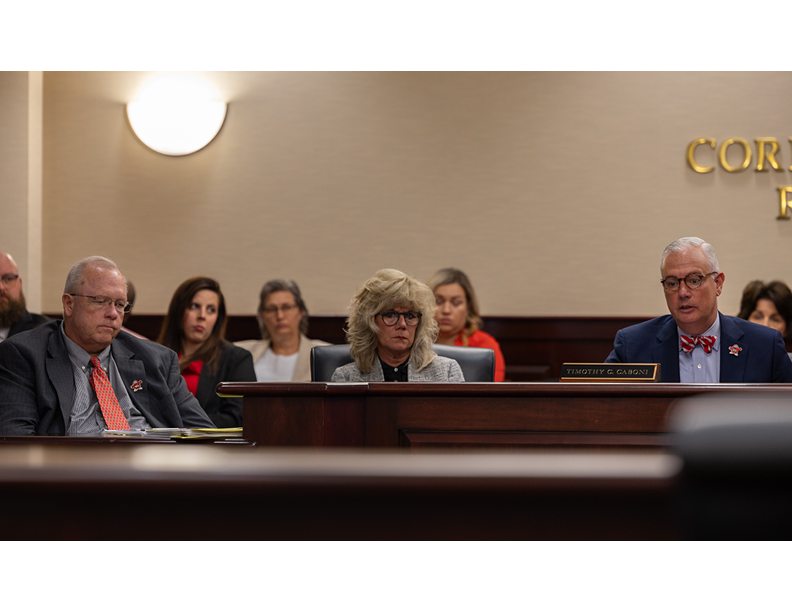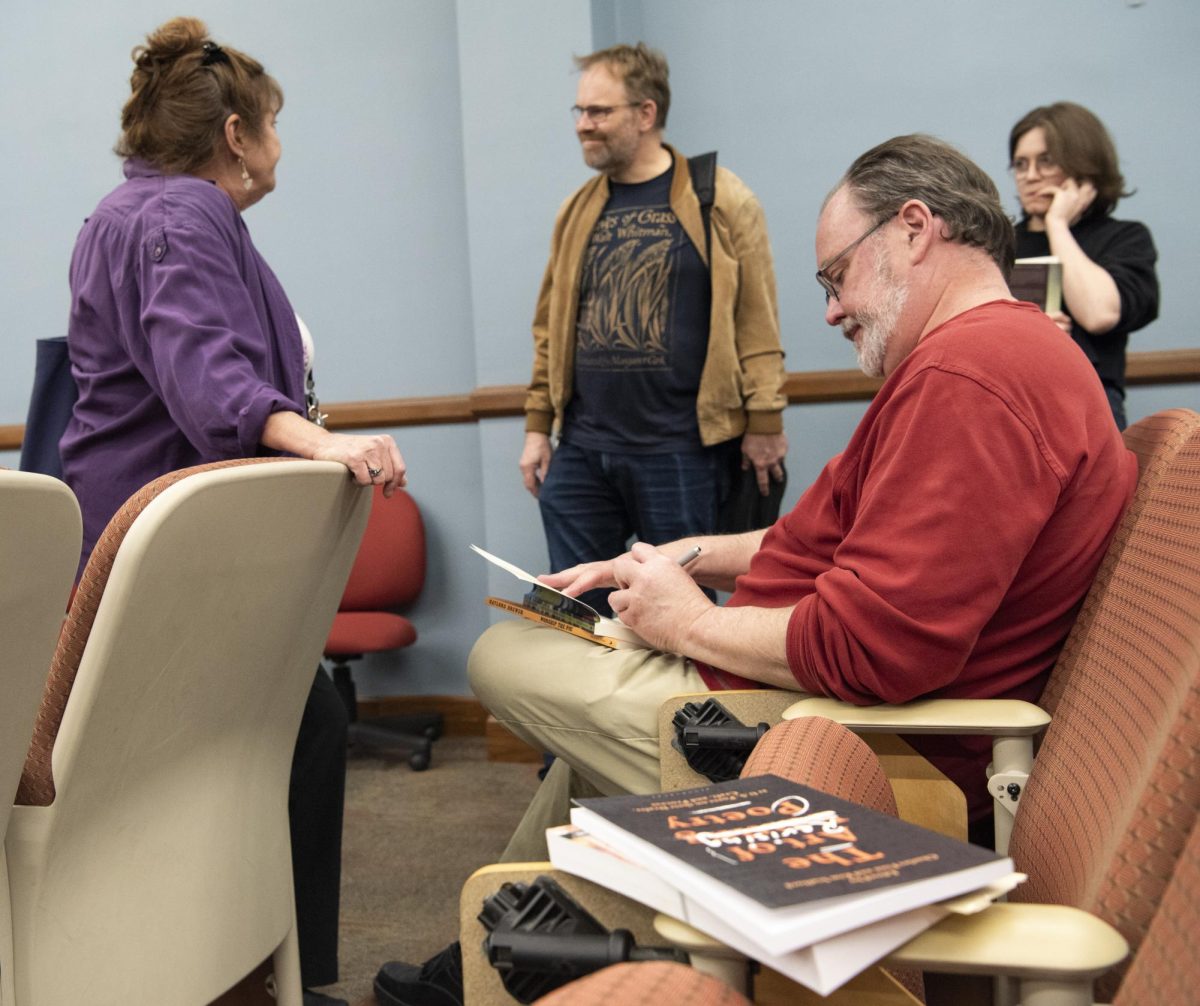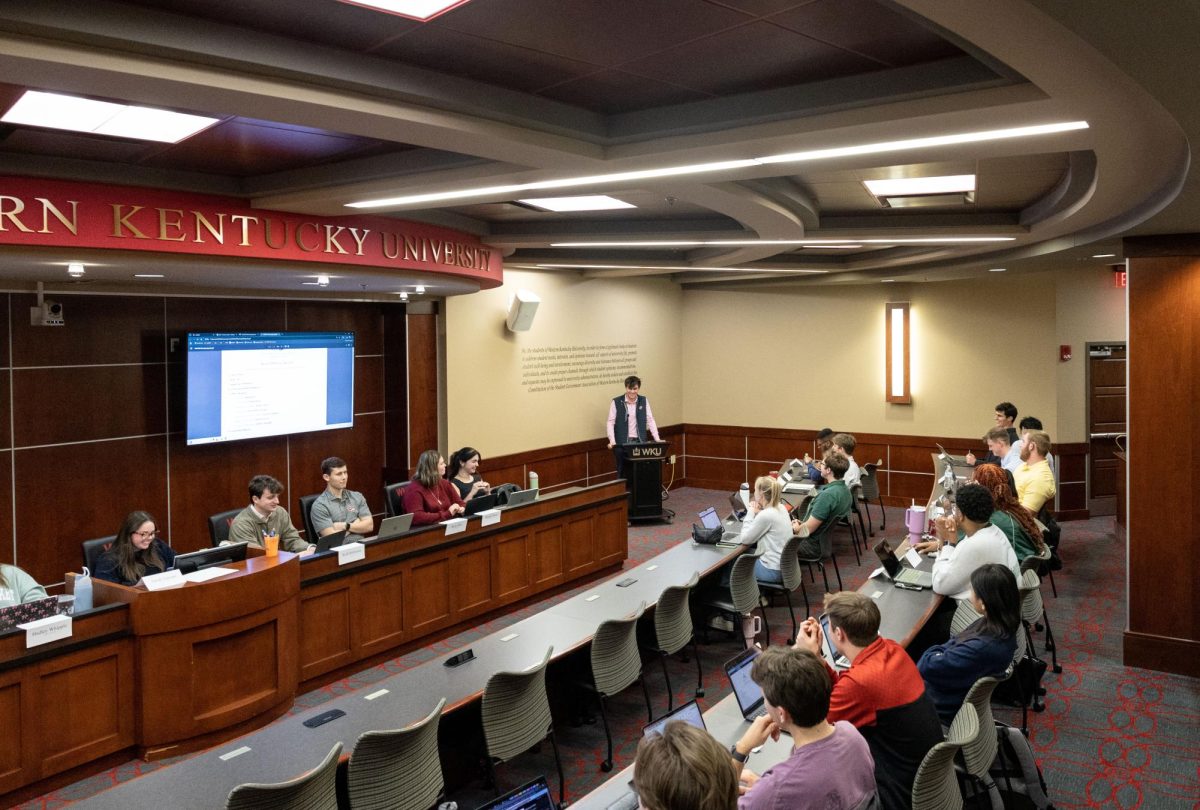At the WKU Board of Regents’ special budget meeting on June 7, Student Regent Sam Kurtz raised a question over Zoom regarding the Student Government Association’s budget for 2024-25, in which he said, “This is something, I guess, I should have asked in the budget meeting on Tuesday.”
There was no publicly scheduled meeting of regents for Tuesday, June 4.
However, there was a series of meetings not open to the public on June 3-4, the three elected members of the Board of Regents confirmed, where regents met in small groups to go over WKU’s proposed budget for 2024-25, ask questions and raise concerns.
While university staff and regents emphasized the legality of the meetings, public access experts say such meetings deny the public education on the decision-making process of the budget and potentially violate the Kentucky Open Meetings Act.
WKU says the series of meetings were purely educational “workshops,” with no formal actions taken, to acquaint regents with the university’s complex budget so that they are better prepared to engage more deeply during the public meeting.
“These important sessions enable Regents to ask more informed questions and hold more insightful and productive discussions about the budget in the public meeting,” Jace Lux, WKU spokesperson, said in an email to the Herald on Thursday. “They require significant time investments from multiple university administrators, clearly signifying the university’s commitment to transparency in the budgeting process and illustrating the importance university administrators place on ensuring Regents are adequately equipped to cast an informed vote.”
Lux said the university, in its commitment to transparency and “desire to conduct meetings lawfully,” has “proactively asked the current Kentucky Attorney General for an opinion on this matter.”
Faculty Regent Shane Spiller said in an email to the Herald on Monday that the WKU Strategy and Operations (budget) staff held “educational briefing workshops for board members” from June 3-4.
In a statement provided to the Herald on June 13, Staff Regent David Brinkley said he and Spiller were invited to a workshop together where they met with Susan Howarth, executive vice president for strategy, operations and finance, and her staff for about an hour and a half on Monday, June 3, at 8:30 a.m. in the Craig Administrative Center, where President Timothy Caboni has his office.
In their separate statements to the Herald, the two elected regents said that they were told the workshop was to be a preview of the 2024-2025 budget presentation along with a briefing of a real estate transaction that was also addressed at the June 7 Board of Regents meeting.
According to Brinkley, Spiller and Kurtz (who also responded by email to the Herald on Monday), the regents were allowed to ask the budget staff questions to “seek clarity” on the 2024-25 budget.
“I asked multiple questions about specific parts of the FY 2025 WKU Budget,” Brinkley said. “There was a power point presentation about features of the FY 2025 budget. Some of my questions were answered, some were not.”
Brinkley also stated that it was not just him and Spiller who attended the budget workshops.
“After the meeting, I greeted Regent (Gary) Broady and Chair (Currie) Milliken who, I assumed, were there to occupy a meeting slot immediately following us,” Brinkley said.
Kurtz also shared knowledge about these workshops.
“They (the budget staff) have a meeting with the board members prior to the budget meeting,” Kurtz said. “Basically, it’s just breaking down the budget and allows for questions.”
These budget workshops are not new for WKU administration, both the university and Spiller confirmed.
“These workshops have been a part of the budget process each year I have been on the Board — although each year the Board member in my workshop has been different based on schedules,” Spiller said.
Lux said that no regent is obligated to attend a workshop, and the workshops are based on the availability of the individual regents.
In 1974, the Kentucky General Assembly enacted the Open Meetings Act, which established a right of access to public meetings. The General Assembly recognized that “the formation of public policy is public business and should not be conducted in secret,” according to the Kentucky Attorney General’s office.
The Open Meetings Act applies to all meetings held by state and local government agencies, including “any boards, commissions, committees, subcommittees, advisory committees, or ad hoc committees, which are established, created, and controlled by a public agency.”
According to KRS 61.810, “All meetings of a quorum of the members of any public agency at which any public business is discussed or at which any action is taken by the agency, shall be public meetings, open to the public at all times [except as otherwise provided in the Act].”
Spiller said the workshops do not violate the Open Meetings Act.
“It was not a board meeting, there was not a quorum of members from any of the committees,” Spiller said, “In my workshop we had 2 of the 5 members of the Budget and Finance Committee, therefore it is not possible to take any action.”
Michael Abate, a First Amendment lawyer for Kaplan, Johnson, Abate and Bird, the Louisville firm that represents the Herald as a member of the Kentucky Press Association, said that these workshops seem “plainly illegal.”
“There’s a provision that was added (to the Open Meetings Act) in 1992 to prevent the very kind of series of closed-door meetings to circumvent the public meeting requirements,” Abate told the Herald on Monday.
Abate referenced KRS 61.810(2), which placed restrictions “on the rights of public officials to engage in discussions of the public’s business in any forum other than a public forum.”
It doesn’t matter, Abate said, that none of the regents could make a final decision in the workshops. The whole point of the provision (KRS 61.810(2)) is to prevent a series of meetings where less than a quorum is present in any one meeting, he said.
However, this provision does not mean that every single conversation between board members is a public meeting.
According to a summary of a 2017 opinion of then-Attorney General Andy Beshear in 17-OMD-222, Lawrence Trageser/University of Louisville Board of Trustees, informational calls made by the interim president to board members, notifying them of the decision to place a vice president on administrative leave, did not violate the Open Meetings Act.
The opinion also cites KRS 61.810(2), saying there are two prohibited conducts: “(1) a private meeting of a quorum of the members of an agency at which public business is discussed or action is taken; and (2) a series of less than quorum meetings attended by members of the agency collectively constituting a quorum which are held for the purpose of circumventing the requirements of the Act.”
As Lux noted, the opinion makes reference to another part of the Open Meetings Act, which says: “Nothing in this subsection shall be construed to prohibit discussions between individual members where the purpose of the discussions is to educate members on specific issues.”
The opinion also referenced Yeoman v. Commonwealth of Kentucky (1998), which observed that for a meeting to take place within the meaning of the Open Meetings Act, “public business must be discussed or action must be taken by the agency.”
Public business, as described in the opinion, is not simply any discussion between two officials of an agency but rather the discussion of the various alternatives to a given issue about which a board has the option to take action.
“This feels, to me, different,” Abate said in reference to the University of Louisville case.
In the instance of WKU’s workshops, Abate considers them to be “working meetings” where questions that are asked by board members would generally be expected to be vetted and aired out in a public setting.
“I think this is clearly a terrible practice from the governance standpoint, because the public is not able to see what questions the regents have about the budget,” Abate said. “(The public is) not able to hear the answers that are provided by the staff.”
Abate said that he doesn’t think this practice benefits the regents either.
“The regents themselves are not able to get the benefit of their colleagues’ questions and the answers to that,” Abate said. “It seems almost specifically designed to keep the public in the dark and to sort of keep the regents isolated from one another in a way that they can’t effectively oversee the administration’s decision-making on particular budget questions.”
WKU says that these workshops help prepare the regents to share concerns and opinions about the budget during the public meeting.
“The spirited conversations which took place in the June 7 open meeting are a testament to the fact that these workshops helped better prepare the Board to express concerns and opinions about the budget before voting,” Lux said.
Lux referenced the discussions prompted by Brinkley and Spiller at the June 7 budget meeting where the two regents brought up concerns over the 7.5% unit realignment and the new 10% overhead charge on auxiliary and revenue-dependent units.
The budget presentation by Howarth, Provost Bud Fischer, and Caboni on June 7 lasted about 35 minutes. The question and answer phase of the budget meeting lasted about 50 minutes and was dominated by Brinkley and Spiller.
During that time, Melissa Dennison and Kurtz were the only other regents to ask questions, both brief. The budget was approved 8-3, with Brinkley, Kurtz and Spiller voting no.
In his email, Spiller compared the workshops before the meeting to other “educational meetings,” which he said that he has reported to the faculty senate during his time as a regent.
Even still, Amye Bensenhaver, co-founder of the Kentucky Open Government Coalition, told the Herald on June 14 that such educational meetings shouldn’t be limited to just the board members.
“Guess what? The public wants to be educated, too,” Bensenhaver said. “We want to know what they’re basing their decisions on, relative to the budget. We want to know what factors they’re considering, what information they’re privy to.
“So, in other words, we should get to know every bit as much as they do.”
Abate and Bensenhaver both shared that they believe the budget, alongside academics, is of utmost importance for the university.
The budget is one area where every person and department has a vested interest, Abate said. It’s extremely important that information is provided for the public, he said, especially when there are questions about how funding is allocated.
“If all that work is being done behind-the-scenes before it’s presented to the regents, then that’s just a show meeting,” Abate said. “It’s as if the cake is already baked, and they’re just voting on whether to eat it.”
Abate said a more transparent approach would be to hold public workshops where all of the board members can hear each other’s questions and concerns, with the public able to listen.
“Why are they doing these lengthy briefings behind closed doors, as opposed to just inviting all the board members with the public able to watch?” Abate asked. “Why do they need that behind closed doors?”
Abate said that he believes there’s no benefit for the regents to meet in smaller groups rather than in a larger, open meeting.
Administration, Abate said, could have spent one day — by Zoom, in person or hybrid — workshopping the budget rather than spreading it over two days behind closed doors. Public confidence in budgeting processes is destroyed when discussions are held behind closed doors, Abate said.
“So it seems to me, clearly, this was intended to allow for wide ranging and free flowing business discussion out of the public eye,” Abate said, “And that’s a violation of the open meeting law.”
News reporter Cameron Shaw can be reached at cameron.shaw555@topper.wku.edu.





